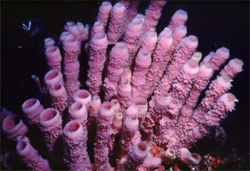The genetic way to identify sponges
Sponges are an ancient phylum of animals found in marine and freshwater habitats, and their systematic classification poses many problems for zoologists. A new archive of DNA sequences promises to make the task far less taxing for taxonomists.
04.07.2012

Sponges belong to the oldest and most primitive animal phylum on Earth. They are found in all marine environments and almost all freshwater habitats worldwide, and play a significant role in many ecosystems. Sponges are known to synthesize a wide variety of secondary metabolites, and are consequently of great interest to pharmacologists.
To expedite biotechnological investigations and facilitate analyses of biodiversity and conservation projects, it is important to have a rapid and reliable means of identifying specimens. Species-specific DNA sequences - so-called DNA barcodes – provide an ideal molecular tool for taxonomic classification. Researchers led by LMU geobiologist Professor Gert Wörheide, in close collaboration with colleagues in an Australian institution, have now applied this method to sponges for the first time.
Rare museum specimens
Members of the international Sponge Barcoding Project (www.spongebarcoding.org) determined the DNA barcode sequences in more than 7400 sponges. The resulting library should make species determination much easier in future. “Some of the material we used came from specimens in the Queensland Museum in Brisbane that were collected decades ago. This underlines the value of existing museum collections for the preparation of genetic reference libraries, and the power of international collaborations to accelerate progress in science” says Wörheide.
During in the course of the study, the researchers ran into problems arising from contamination with foreign DNA or chemical interference from secondary metabolites. The methods they developed can deal effectively with such complications.
Publication:
Sergio Vargas, Astrid Schuster, Katharina Sacher, Gabrielle Büttner, Simone Schätzle, Benjamin Läuchli, Kathryn Hall, John N.A. Hooper, Dirk Erpenbeck & Gert Wörheide (2012): Barcoding sponges: an overview based on comprehensive sampling. PLoS ONE. 7(7): e39345

